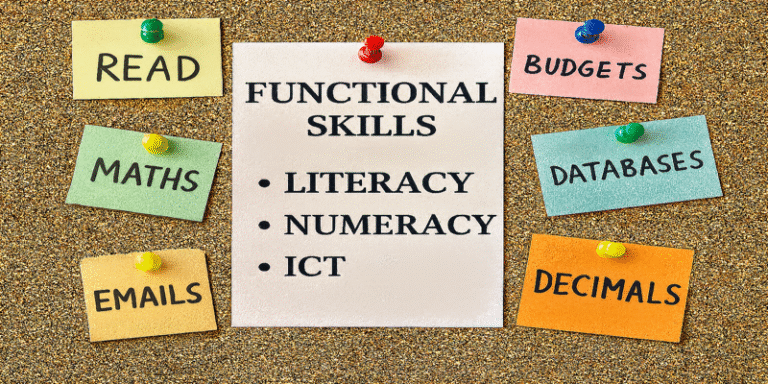In the 21st century, Functional Skills—comprising Literacy, Numeracy, and Information & Communication Technology (ICT)—are no longer optional assets but essential competencies for navigating the demands of modern life, employment, and education. These foundational skills, often termed Essential, Key, or Core Skills, represent a practical, real-world application of knowledge and are critical for enabling individuals to function independently and confidently across multiple domains (Smith, 2020).
Functional Skills are transferable skills, equipping learners to solve problems, communicate effectively, manage information, and make sound decisions in everyday contexts. They are embedded in the UK education and employment frameworks, forming the bedrock of personal development, vocational training, and lifelong learning (Department for Education, 2024).
1.0 Core Components of Functional Skills
1.1 English (Literacy)
Literacy encompasses the ability to read, write, speak, and listen effectively, underpinning communication and comprehension in personal and professional settings.
1.1.1 Reading
Reading proficiency enables individuals to understand written instructions, reports, safety signs, and technical manuals. For instance, a healthcare assistant must interpret care plans and medication charts accurately. According to Griggs and Kelly (2018), reading comprehension is directly linked to academic success and workplace efficiency.
1.1.2 Writing
Writing is more than transcription—it involves clarity, tone, structure, and appropriate vocabulary. Clear written communication is crucial for tasks such as completing application forms, writing emails, or creating reports. Strong writing skills reduce misunderstandings and promote professional credibility (Harrison & Satchwell, 2021).
1.1.3 Speaking
Verbal communication is integral for collaboration, leadership, and persuasion. Speaking skills allow individuals to articulate ideas confidently, adapt speech to the audience, and actively contribute to discussions. In the retail industry, for example, these skills are essential when handling customer enquiries or resolving conflicts.
1.1.4 Listening
Effective listening involves attention, interpretation, and feedback. It enhances interpersonal relationships and team dynamics. Research shows that active listening improves workplace productivity and reduces errors, particularly in high-stakes environments such as aviation and healthcare (Rowland, 2022).
1.2 Mathematics (Numeracy)
Numeracy is the ability to use numbers and mathematical reasoning to solve problems and make decisions. It is fundamental to personal finance, workplace responsibilities, and critical thinking.
1.2.1 Using Numbers
This includes skills in addition, subtraction, multiplication, division, and working with fractions, percentages, and decimals. Numeracy is vital in everyday scenarios such as budgeting, measuring ingredients, or calculating change. In business, accurate financial calculations ensure profit forecasting and budgeting (Noyes et al., 2021).
1.2.2 Applying Mathematical Concepts
Advanced numeracy involves concepts such as algebra, geometry, and data analysis, useful in fields like engineering, logistics, and IT. For example, construction workers use geometric calculations to ensure accurate design implementation.
1.2.3 Interpreting and Presenting Data
Interpreting charts, tables, and graphs is a skill used in many roles, especially where data-driven decision-making is essential. For example, marketing professionals rely on visual data to analyse consumer trends and optimise campaign strategies.
1.3 Information and Communication Technology (ICT)
ICT Functional Skills prepare individuals to engage with digital technologies confidently, a critical skill in a digitally interconnected world.
1.3.1 Using ICT Systems
ICT usage includes familiarity with operating systems, cloud-based software, and file management. Employees in administrative roles use ICT to manage databases, schedule meetings, and maintain communication (Beetham & Sharpe, 2019).
1.3.2 Finding and Selecting Information
This involves using search engines, databases, and evaluative skills to identify credible sources. In academic and professional environments, the ability to distinguish reliable from misleading information is a key digital literacy component (Jisc, 2020).
1.3.3 Developing and Communicating Information
ICT competency also includes creating presentations, spreadsheets, and multimedia content. For instance, project managers use Excel to manage budgets and deadlines, while educators use tools like PowerPoint to deliver lessons.
2.0 Relevance in Modern Society
2.1 Enhancing Employability
Employers value candidates who can communicate, calculate, and use digital tools effectively. A recent study by the CBI (2023) revealed that over 70% of employers believe Functional Skills are as important as academic qualifications.
For example, a customer service representative must write professional emails (literacy), manage invoices (numeracy), and use CRM software (ICT). Apprenticeships and vocational programmes in the UK embed Functional Skills into their curriculum to address skills gaps and prepare learners for real-world job demands (Ofqual, 2023).
2.2 Supporting Lifelong Learning
Functional Skills serve as the foundation for higher learning. Adults returning to education often begin by improving their Functional Skills to enhance their academic capacity and employability.
Literacy enables critical reading, numeracy enhances statistical understanding, and ICT supports online and hybrid learning environments. According to the National Careers Service (2024), access to lifelong learning increases self-efficacy and social mobility.
2.3 Promoting Personal Development
Beyond the workplace, Functional Skills empower individuals to navigate daily life:
- Literacy improves civic engagement by enabling individuals to read political materials and participate in debates.
- Numeracy helps manage mortgages, credit cards, and investment portfolios.
- ICT supports social connection, health management (e.g. NHS apps), and access to government services.
These skills also contribute to mental wellbeing by reducing stress in dealing with everyday tasks, from reading prescription labels to booking travel.
3.0 Integrating Functional Skills in Education and Training
Functional Skills are embedded in UK education policy and often a mandatory component of apprenticeships, T-Levels, and adult learning qualifications. They are assessed through practical, scenario-based tasks to ensure real-life relevance.
Teachers and trainers are encouraged to contextualise learning—for example, teaching percentages through household budgeting or using real-world documents like payslips and contracts to develop reading comprehension.
A study by Hodgson and Spours (2018) found that integrating Functional Skills into vocational learning increased learner motivation and improved retention, especially among adult learners and NEET (Not in Education, Employment, or Training) populations.
4.0 Addressing Challenges in Functional Skills Delivery
Despite their importance, many learners face barriers such as:
- Low confidence in maths or ICT.
- Previous negative school experiences.
- Limited access to technology.
Addressing these requires a focus on inclusive teaching methods, the use of assistive technologies, and flexible delivery formats such as online, hybrid, and community-based learning (ETF, 2022).
5.0 Looking Ahead: Functional Skills in a Digital Future
As society becomes increasingly data-driven and automated, Functional Skills will evolve. ICT will expand to include cybersecurity, AI literacy, and digital collaboration. Numeracy will integrate data science elements. Literacy will extend to evaluating AI-generated content, deepfakes, and misinformation.
Investing in upskilling programmes and incorporating digital ethics and critical thinking will ensure learners are not just functionally literate but digitally empowered citizens (Helsper & Eynon, 2020).
Functional Skills in Literacy, Numeracy, and ICT are the cornerstones of personal empowerment, employability, and lifelong learning. They are practical, adaptable, and essential in our increasingly interconnected world. For individuals, they enable independent living, for employers, they ensure productive and adaptable teams, and for society, they promote equity and participation.
As educational policies and workforce demands continue to evolve, the commitment to developing Functional Skills must remain central to inclusive, forward-looking learning strategies.
References
Beetham, H. & Sharpe, R. (2019) Rethinking Pedagogy for a Digital Age. 3rd ed. Abingdon: Routledge.
CBI (2023) Education and Skills Survey: The Changing World of Work. [Online] Available at: https://www.cbi.org.uk.
Department for Education (2024) Functional Skills Qualifications. [Online] Available at: https://www.gov.uk/government/collections/functional-skills-qualifications-requirements.
Education and Training Foundation (ETF) (2022) Improving the Delivery of Functional Skills. [Online] Available at: https://www.et-foundation.co.uk.
Griggs, J. & Kelly, A. (2018) Effective Adult Literacy. London: Sage.
Harrison, C. & Satchwell, C. (2021) Functional Skills in Context: Writing for Work. Manchester: National Learning Foundation.
Helsper, E.J. & Eynon, R. (2020) ‘Digital Skills Inequalities’, Information, Communication & Society, 23(4), pp. 614–630.
Hodgson, A. & Spours, K. (2018) ‘The Role of Functional Skills in Apprenticeships’, Journal of Vocational Education and Training, 70(3), pp. 421–437.
Jisc (2020) Digital Experience Insights Survey 2020. [Online] Available at: https://www.jisc.ac.uk.
National Careers Service (2024) Functional Skills Courses. [Online] Available at: https://nationalcareers.service.gov.uk.
Noyes, A., Wake, G. & Drake, P. (2021) Numeracy in the Workplace: The Hidden Demand. Nottingham: University of Nottingham.
Ofqual (2023) Functional Skills Qualification Review. [Online] Available at: https://www.gov.uk/government/organisations/ofqual.
Rowland, L. (2022) Listening in the Workplace. Bristol: Workplace Communication Press.
Smith, A. (2020) ‘Functional Skills: Building Blocks for Success’, Journal of Essential Competencies, 10(1), pp. 45–56.









